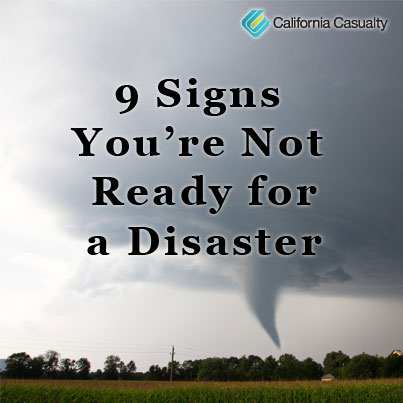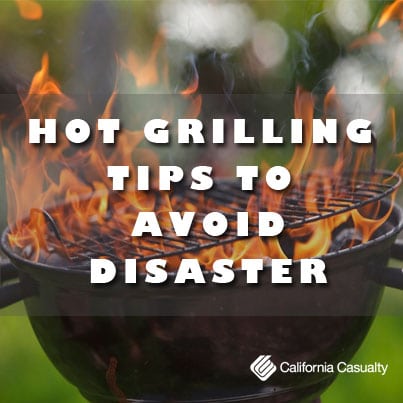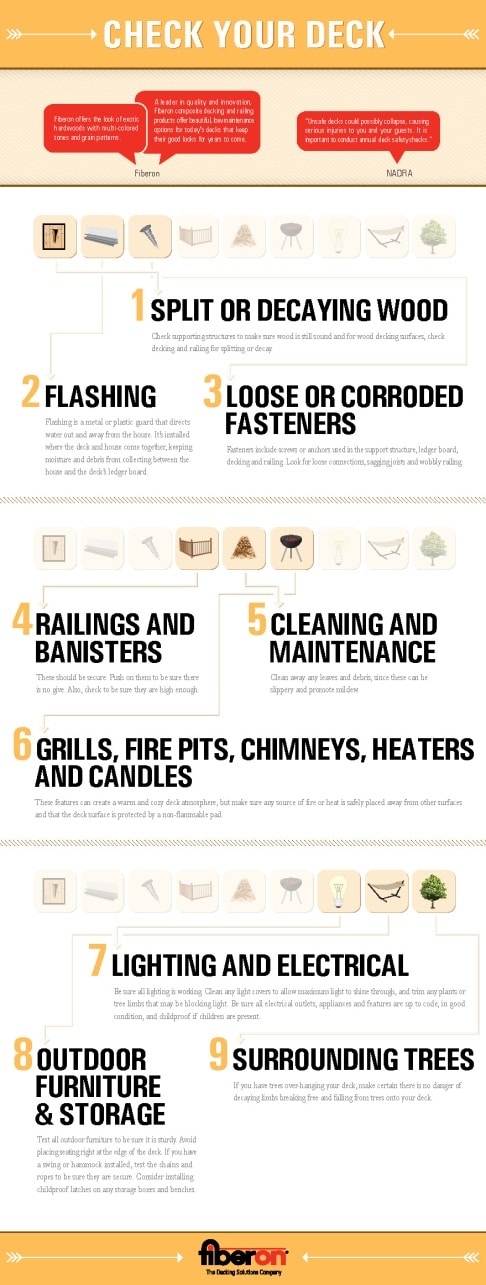by California Casualty | Homeowners Insurance Info |

If you live in a flood prone area, you should have flood insurance. It seems like common sense but many of us still don’t get it. As rivers crested to new heights and raging waters destroyed homes in Central and Southern Texas this spring, the Insurance Council of Texas fears that less than half of those with damage purchased a flood policy. Many thousands affected by record flooding in South Carolina may also be without flood insurance; state insurance companies estimate that only 10% of residents purchased flood protection.
Here are some reasons why people don’t buy flood insurance:
- They think their homeowners or renters insurance covers flooding
- They think the government will help them
- They think it’s too expensive
- They didn’t know it was available
Floods are the number one disaster in the United States and the National Flood Insurance Program estimates that just three inches of water in a 2,000 square foot house will result in $23,000 in damage.
With that in mind, let’s soak up seven myths that might be floating around about flood insurance.
- Flooding is covered under most homeowners insurance.
It is not. Homeowners and renters need to purchase separate flood insurance protection. Umbrella insurance does not usually cover flooding.
- I don’t live in a flood prone area so I don’t need it.
Every state in the union has experienced flooding and it can happen anywhere. The National Flood Insurance Program estimates that 25 percent of flood claims come from areas outside of high-risk flood zones.
- The Federal Government will help pay for flood damage.
Federal disaster assistance is only available when the president formally declares a disaster. The aid comes as low interest loans, not compensation for your damage.
- Flood insurance is only for homeowners and businesses.
Flood insurance is available to renters. It is also available to condo owners and renters. It will cover damage to your possessions from a flood.
- Flood Insurance is expensive.
The average policy costs about $700 per year: the higher your risk, the higher your premium. Keep in mind the average residential flood claim amounted to more than $38,000.
- I can get flood insurance coverage immediately.
In most cases there is a 30 day waiting period from the date you purchase the insurance before it goes into effect.
- I can shop around for the best flood insurance deal.
While you can purchase flood insurance from numerous companies, the price is set by the federal government and doesn’t vary. Rates do vary depending on your flood risk and the year and type of construction.
If you have experienced flood damage, here are some things you should be doing:
- Make sure the building is safe to enter – mud and water may contain dangerous chemicals, bacteria or poisonous snakes and there could be a risk from electrocution
- Secure the property from further damage or theft with plywood, tarps or plastic
- Remove branches and other debris
- Before cleanup, take photos or videos of all the damage
- Throw out water damaged food including canned goods
- Keep receipts for any items you buy to make temporary repairs and for living expenses, they may be covered if your loss is insured or can be used for tax purposes if the loss is not covered
- Contact your insurance company – flooding and other water damage to your vehicle is covered if you have comprehensive auto insurance
For more information about what is and is not covered with flood insurance, visit https://www.floodsmart.gov/floodsmart/pages/residential_coverage/whats_covered.jsp.
California Casualty can help keep you above water with flood insurance. Find out more today at 877.652.2638 or visit www.calcas.com/flood-insurance. Make sure your property is fully protected from wind, fire, lightning, hail or falling trees with a policy review by calling an advisor today at 1.800.800.9410 or visiting www.calcas.com.
Resources for this article:
https://www.floodsmart.gov.
https://www.ready.gov/floods
https://www.thestate.com/news/local/article37740939.html
by California Casualty | Homeowners Insurance Info |

Why should I worry, there’s never been a disaster or emergency in my area before? If that’s your reaction to emergency preparation, you’re setting your family up for disaster. Here are nine other signs you probably aren’t ready for the unexpected:
- You have no property insurance or the “bare minimum” because your house is paid off.
- You couldn’t be bothered signing up for those annoying cell phone emergency alerts.
- What’s a weather alert radio?
- You only know one way in and out of your neighborhood.
- When someone mentions geographic land features, you think they are talking about the mound left in the front yard where the tree was removed last year.
- When you hear there is a tornado or severe thunderstorm watch, you actually go out to watch for them.
- You think a bottle of water and a fanny pack are all you need if you are evacuated.
- Having a home inventory means knowing how much toilet paper and milk you have.
- Heck, we’ve been waiting for that big storm so we can get a new roof (we already have five leaks, what’s one more).
Seriously, disaster preparation is not a laughing matter; just ask anyone who survived the fury of Hurricane Sandy, the horrors after Hurricane Katrina, or dug through the ashes of their homes in the recent disastrous West Coast fires. September is National Preparedness Month when emergency experts are asking everyone to know their risks, develop a plan, prepare an emergency supply kit and make a home inventory. In the next few days and weeks we’ll share details on things you need to do before a disaster strikes. In the meantime, visit www.ready.gov for more information on preparing for an emergency, before it’s too late.
by California Casualty | Auto Insurance Info, Homeowners Insurance Info |

Odds are you know someone who is getting married this summer. Now through September is when the majority of weddings take place each year in the U.S. While it’s a time of joy and dreams of the future, there are many important decisions: how many people to invite, is there a need for a wedding planner, who will cater the meal and what about entertainment. Once the rings are exchanged and the honeymoon is over, there’s another important step – getting your auto and home insurance in order. Here’s a checklist for newlyweds.
- Combine Your Insurance
If you both have separate cars with different insurance companies, now that you are married you can find discounts by putting both vehicles on the same policy. It will also ensure that both drivers are covered no matter which car they use. Get extra savings by bundling your autos with your home or renters insurance.
- Marriage Discount
Make sure to inform your insurance company that you got married – most auto and home insurance companies offer important discounts for newlyweds. Men under the age of 25 are usually considered high risk drivers. However, once they marry they often see a big drop in insurance premiums. The lower rates can also apply to those in domestic partnerships.
- Increase Homeowner or Renters Coverage
Wedding presents are wonderful. You now have a new set of china, expensive new appliances and other things for your home. These assets need to be covered. Talk to an insurance advisor to make sure you have enough coverage to protect all the things you own and to increase your liability protection. It’s also a great time to create an inventory of all the things you own to help you purchase the right insurance protection and make filing a claim much easier.
- Get Extra Protection for High Value Items
That beautiful new wedding ring and special gifts like fine art or silverware may need scheduled personal property protection, often called a “floater,” to make sure they are covered for their full value. Most homeowners and renters policies will provide limited coverage for those items. Scheduled personal property coverage will also pay to replace a ring, without a deductible, even if it was misplaced or damaged in the disposal.
Just like marriage, California Casualty is a committed partner in helping with your auto and home insurance needs. Don’t go it alone, contact a California Casualty advisor today for a free quote or no hassle policy review at 1.800.800.9410 or visit www.calcas.com.
Resources for this article:
https://www.knowyourstuff.org
by California Casualty | Homeowners Insurance Info |

The mouthwatering smell of hamburgers, chicken and other grilled foods will soon start filling the air – but as Fourth of July weekend arrives (the unofficial start of BBQ season) the National Fire Protection Association (NFPA) is warning grillers to be careful.
According to a 2013 NFPA report, an average of 8,600 home fires were started each year between 2007 and 2011 by gas or charcoal grills, 60 percent of those flared up on a balcony, porch or outside patio.
The NFPA advises everyone to make sure the grill is working properly and review safety tips before firing it up. It’s extremely important to check gas canisters and hoses for cracks, breaks or leaks.
Did you know ESPN SportsCenter anchor Hannah Storm was severely burned in a gas grill accident? She has recorded several videos to share her story and raise awareness about grilling safety.
Here are some home grilling safety tips from the NFPA:
- Read you grills safety tips and warning information before using it
- Only use propane and charcoal outdoors
- Check gas tanks and hoses for leaks
- Stay alert when grilling
- Keep grills well away from the house, deck railings, overhanging eaves and branches
- Never leave the grill unattended
- Be careful when disposing charcoal; always make sure coals they are completely out and put into a meal container with a lid
Accidents happen. Make sure your home or apartment is fully protected with the right amount of insurance. Call a California Casualty advisor today for a policy review, 1.800.800.9410 or visit www.calcas.com.
Resources for this article:
https://www.nfpa.org/
by California Casualty | Homeowners Insurance Info |

Decks; they come in all sizes, shapes and age. They’re an extension of our living space as the weather warms and we spend more time outdoors. They can also be an accident waiting to happen.
A study by the Consumer Product Safety Commission estimated that close to 50,000 people are injured each year from falls off decks, porches and stairs; about 15 percent of those were from a structural failure or collapse.
Summer is when most deck collapses are reported. The International Association of Certified Home Inspectors says of the more than 45 million existing decks in North America, only 40 percent are absolutely safe.
Most failures take place while the decks were occupied and approximately 90 percent were a result of separation of the house and the deck ledger board. While age can be a factor, deck collapse can take place on any deck that was not properly installed.
Here are five deck safety and inspection tips from the North American Deck and Railing Association (NADRA) that can keep the summer BBQ from becoming a trip to the hospital:
- Search for split or decaying wood including support beams and joists below
- Test railings and banisters to make sure they are firmly attached
- Check fasteners to make sure they have not come loose or corroded
- Step carefully looking for loose boards or spongy areas
- Clean up debris like leaves branches and other things that can cause slipping and mildew
NADRA also urges homeowners to test deck stairs, make sure grills and fire pits are on a non-flammable pad and away from walls and overhangs, and to consider proper lighting for nighttime use.
Michael Beaudry, executive vice president of the NADRA wants people to know about the importance of annually inspecting their decks. “Outdoor structures like decks are exposed to sun, rain, snow and extreme temperature changes over the years. The need to maintain and inspect them is critical for keeping decks strong and safe.”
You can find an extensive point-by-point deck inspection check list from the International Association of Certified Home Inspectors at https://www.nachi.org/deck-inspections.htm.

Another piece of protection is to inspect your home or renters insurance. Now’s a great time to review your policy and make sure you have the proper liability coverage if someone gets hurt at your home. Call a California Casualty advisor today at 1.800.800.9410 or by visiting www.calcas.com.
Resources for this article:
https://nadra.org/
https://www.buildingonline.com/news/pdfs/Outdoor-Deck-and-Porch-Injury-Study.pdf
https://www.nachi.org/deck-inspections.htm
https://www.fiberondecking.com/blog/2015/how-safe-is-your-outdoor-deck-space
This article is furnished by California Casualty, providing auto and home insurance to educators, law enforcement officers, firefighters and nurses. Get a quote at 1.800.800.9410 or www.calcas.com.
by California Casualty | Homeowners Insurance Info |

Summer is more than just a great time for BBQs, baseball and swimming pools; it’s the perfect time to get your home maintenance done.
The experts say warm weather is perfect for:
• Interior and exterior painting
• Power washing exterior walls to remove dust, mold or grime
• Power washing and re-staining decks
• Replacing loose or broken boards on decks and hammering or screwing down nails or screws that have come loose
• Checking roofs for winter wear
• Checking and clearing gutters and drain spouts of debris and making sure the spouts direct water away from the home’s foundation
• Pruning trees and shrubs and removing overhanging branches
• Fixing any plumbing problems while pipes are warm
• Inspecting for insect and termite damage to baseboards, decks or around windows – look for soft spots in wood around doors and windows or mud tubes against outside walls
Summer is also a great time to make sure your home or renters insurance is up-to-date. Get a free policy review with a California Casualty advisor at 1.800.800.9410 or at www.calcas.com.







